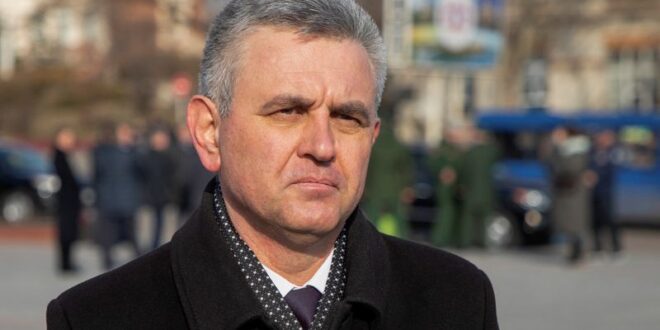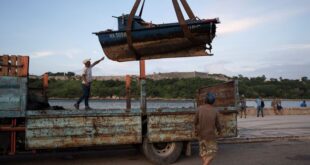CHISINAU (Reuters) – The leader of Moldova’s separatist Transdniestria enclave denounced on Friday the introduction of import and export duties for his pro-Russian region, saying central authorities were violating fundamental rights and crushing business.
Transndiestria broke away from Moldova before the 1991 collapse of Soviet rule and then fought a brief war with the newly independent state, but the two sides have existed side by side with few incidents for more than 30 years. Some 2,000 Russian “peacekeepers” are installed on their joint “border”.
The issue of Transdniestria’s status has taken on new significance as the European Union has agreed to launch talks on joining the EU with Moldova’s pro-European authorities.
Transdniestria’s leader, Vadim Krasnoselsky, said Moldova had acted without warning. Ending his region’s right to export and import goods duty-free, he said, was a “moral defeat” that violated the EU’s proclaimed humanitarian values.
“I appeal to you to reconsider this and come to the negotiating table,” Krasnoselsky said in a television address.
“This is a display of weakness. Discussion and dialogue are a show of strength. What you have done puts us on a path to nowhere, to a void…and people living here will suffer.”
Businessmen and other citizens routinely cross in and out of Transdniestria without difficulty and duties have previously been collected by Transdniestria’s separatist authorities.
Imposing a duty payable to Moldova’s central authorities would place businessmen from the enclave in financial difficulty and boost tension between the two sides.
The region has until recent years been accused, under cover of its duty-free status, of mass smuggling of a variety of goods, including weapons.
Transdniestria receives considerable assistance from Russia, including natural gas supplies for which no payment is demanded.
Talks to resolve the separatist conflict have stagnated for several years, but with little effect on day-to-day life in the country lying between Ukraine and EU member Romania.
Moldovan authorities made no comment on Krasnoselsky’s complaints. But officials have cited introduction of rules applicable throughout Moldova’s territory as a vital legal step in re-integrating the separatist region.
The country, one of the poorest in Europe, has been buffeted by the war in Ukraine and pro-European President Maia Sandu singles out Russia as the chief security threat to the country.
In recent months, Sandu has suggested that Moldova could consider joining the EU in two stages, initially without Transdniestria before achieving reunification.
Officials cite the granting of EU membership to the divided island of Cyprus as a precedent.
(Reporting by Ronald Popeski; Editing by David Gregorio)
 BeritaKini.biz Berita Viral Terkini di Malaysia
BeritaKini.biz Berita Viral Terkini di Malaysia





